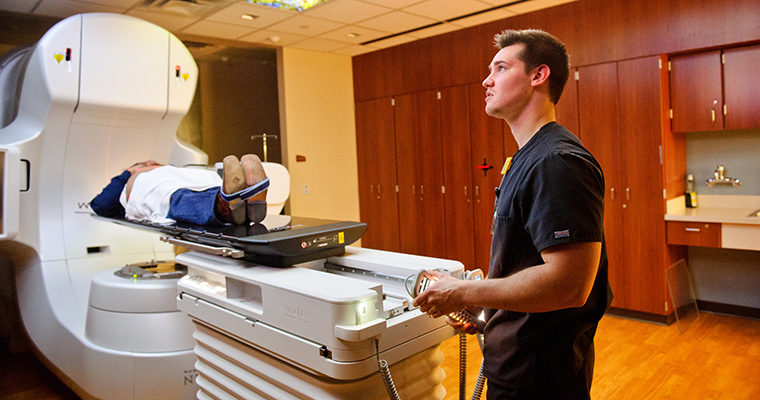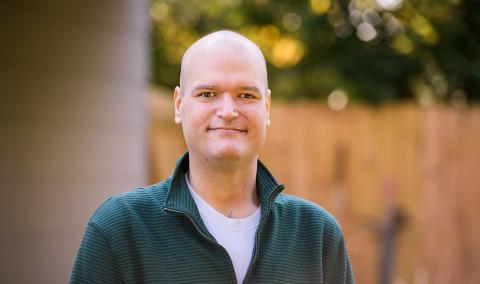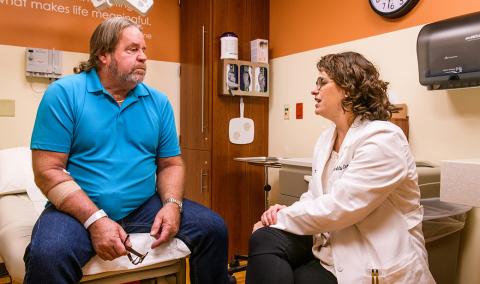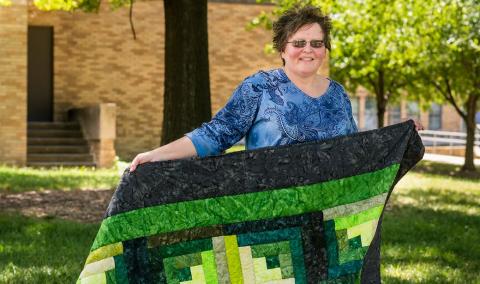If you or a loved one has cancer, you will go through each step of the journey with a team of highly skilled health professionals at MU Health Care.

Part of your cancer care may include radiation therapy, which is a safe and effective treatment used in many types of cancer. Radiation therapy alone is effective for some cancers. For others, radiation may be given before, during or after treatments such as surgery and chemotherapy. Our radiation team consists of radiation oncologists, radiation dosimetrists, radiation therapists, radiation physicists and radiation oncology nurses.
Radiation Oncologists
Radiation oncologists are medical doctors who specialize in using high energy X-rays to destroy cancer cells and shrink tumors in different parts of the body. These doctors work closely with each member of the radiation team — and doctors from other oncology disciplines — to develop the overall plan, monitor progress, make adjustments as needed and make sure each treatment is given accurately. Most people are referred to a radiation oncologist by their primary doctors or another doctor in the cancer team after a cancer diagnosis.
Radiation Dosimetrists
Radiation dosimetrists help generate the treatment plan. Using computers and sophisticated programs, they determine the optimal radiation path and strength to develop the blueprint to effectively target tumors while sparing healthy tissue.
Radiation Therapists
Radiation therapists are trained to operate the sophisticated systems and computers used for radiation treatment. They set up the patient on the treatment table, align them to carefully selected marks to ensure the patient is in the ideal position, and then deliver the daily radiation.
Radiation Physicists
Radiation physicists assist the team by assuring the quality and calibration of the therapy systems used for patient care, making sure the proper radiation dose is given and assisting with developing new applications. They also supervise more complex treatments such as stereotactic radiation therapy (SRT), stereotactic radiosurgery (SRS) and brachytherapy.
Radiation Oncology Nurses
Radiation oncology nurses help care for patients during consultations, treatments and follow-up care. At consultation, they help explain possible side-effects and go over patient education, which summarizes the expected reactions patients may encounter. During treatment, the nurses help assess for side effects, assist in checking vital signs and facilitate getting the appropriate medications or care. They evaluate treatment progress and can provide support and counseling to the patient and family. The nurses also help communicate with other teams involved in oncology care, and can help coordinate care.
Stereotactic Radiation
Stereotactic radiation is highly focused radiation delivered to a small, focused target in the body over a handful of treatments. It can offer the equivalent of weeks of radiation in one to five sessions. Our radiology oncologists specialize in delivering stereotactic radiation throughout the body: lung, adrenal, spine and, in qualifying cases, liver and pancreas. We also offer stereotactic radiosurgery for brain diseases.
Our radiation team works with other specialized medical doctors to provide our patients with optimal cancer treatment. Every week, doctors — surgeons, oncologists, pathologists and radiologists — involved in treating a specific site of disease meet for tumor boards to discuss, review and develop the optimal treatment plan for each patient.
At MU Health Care, we know going through cancer is challenging. That’s why we focus on the entire body by offering expert care through dietitians, social workers, physical and occupational therapists, speech pathologists, audiologists and oral surgeons.



























